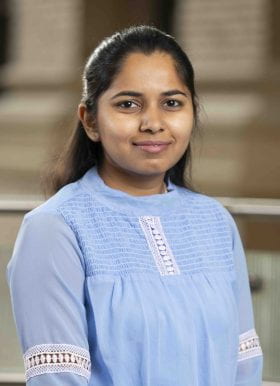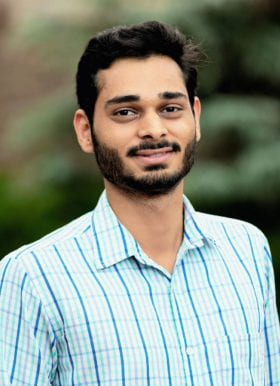
Blerta Stringa, Ph.D.
Blerta is a biomedical scientist. She came from Europe in 2020 and started her postdoctoral fellowship with Prof. Solnica Krezel in the Developmental Biology department. She is working on exploring mechanisms of early development by using both zebrafish and human embryonic stem cells. Early in 2021, she became a member of the postdoc society, and she is eager to support and welcome new postdocs into this group. She has also been serving as the Networking committee chair for close to two years.

Adebiyi A Adeniran, Ph.D.
Executive Council Member
- Email: a.a.adeniran@wustl.edu
Adebiyi is a molecular entomologist and molecular parasitologist with over a decade of Neglected Tropical Disease (NTD) research and control program experience in sub-Saharan Africa and in Mexico. Adebiyi has previously worked as the Regional Technical Lead for NTD diagnostics for Sightsavers UK, where he provided technical and advisory support to NTD control programs in fifteen sub-Saharan African countries. His broad experience includes both field and laboratory research on multiple PC-NTDs including onchocerciasis, lymphatic filariasis, soil-transmitted helminthiasis and schistosomiasis. His NTD program implementation experience includes transmission assessment, post-treatment and post elimination surveillance activities, diagnostic capacity building, and operational research. His particular research interests are focused around NTD control methods that can be easily taken up by programs in low-resource settings. He has a Doctor of Science in Biotechnology (summa cum laude) from Instituto Politecnico Nacional (Mexico) that was supported by a Mexican Government Scholarship. He has his BSc (Biological Sciences) and MSc (Parasitology) degrees from the Federal University of Agriculture, Abeokuta Nigeria, with First Class and Distinction, respectively. He is passionate about joining Washington University and the DOLF team and looks forward to contributing to the team’s laboratory and field research projects to support elimination of NTDs.

Sumedha Agashe, PhD, Integrated BS-MS
Secretary
Sumedha is a molecular biologist focussing on molecular oncology. She moved to United states after completing her Ph.D. from IFOM Foundation, Milan in Italy. She is currently a postdoctoral researcher in Vindigni lab in the division of Oncology. She is mainly interested the field of genomic integrity, DNA replication and repair. Her postdoctoral research focusses on effect of DNA methylation and de-methylation on DNA replication, genomic integrity and oncogenesis. She is a member of Outreach committee of WUPS.

Rishabh Bajpai, PhD, B.Tech
Outreach Director, Member (Wellness and Networking) and (Outreach)
- Email: bajpair@wustl.edu
Rishabh is a postdoctoral researcher at Aravamuthan Lab, WashU. He is working on developing intelligent systems for quantifying motor disorders in children with Dystonic Cerebral Palsy under the supervision of Dr. Bhooma Aravamuthan. He is interested in multi-disciplinary approaches to solving real-world problems.
His vision is a world where he is healthy in a holistic sense, encompassing mental, physical, and emotional well-being. In this world, disabilities are not seen as limitations but as opportunities to push the boundaries of technology and promote inclusivity and accessibility for all. With this vision he is working as an Executive Council Members in Wellness and Networking committee.

Kanwal Batool, PhD
Chair Networking and Wellness, Member Outreach
Kanwal B. Naqvi is a postdoctoral research associate in the Department of orthopedic surgery. She is currently researching the metabolic signature of inflammatory bone disorders. She earned her PhD in clinical genetics from Quaid-i-Azam University, Pakistan, where she explored the role of genetic polymorphisms in the progression of osteoarthritis. During her PhD, she received a research fellowship and worked at the University of Aberdeen, (Scotland) where she investigated the interactions between biomechanical factors and inflammatory mediators in cartilage degradation. When she is not working, she enjoys exploring new places and restaurants, scenic walks, long drives and reading. She loves working in multicultural environment and learning about different cultures. She is a member of Networking and Wellness and Outreach committees, and her aim is to improve the lives of fellow postdocs by fostering an inclusive and diverse environment.

Saumya Bhagat, PhD, MTech, BTech
Member (Networking and Wellness)
- Email: bhagat@wustl.edu
I am an inflammation researcher focused on studying the mechanisms, causes, and effects of inflammation in the body. Currently, I am working as a Postdoc in the Mbalaviele lab at WUSM, Division of Bone & Mineral Diseases, dedicating my efforts to understanding the role of inflammasomes in infectious osteomyelitis. As part of my PhD from the Defence Research & Development Organisation (DRDO), New Delhi, I explored the role of Tissue Factor activation in hypoxia-induced sterile inflammation. As a member of the WUPS EC, I am a part of the Networking and Wellness Committee.

Ukti Bhatt, PhD, M. Pharma
Member (Networking and Wellness)
- Email: ukti@wustl.edu
I’m Ukti Bhatt, a postdoctoral researcher in the Department of Surgery, focusing on cancer research. With a PhD in 3D printing drug delivery, I innovate drug delivery methods to advance oncology treatments. Beyond research, I bring a vibrant, outgoing personality, aiming to infuse positivity into both my professional and personal endeavours.

Kapur Dhami, PhD, M. Sc.
Member (Networking and Wellness)
I hail from Nepal and working in the division of Oncology since 2023. My research study focuses on the understanding of the complexity of cancer biology and related therapeutic approaches using various spatial techniques and preclinical models. I will be working with the networking and wellness team in EC

Andrea Gokus, Ph.D.
Danforth Representative (Networking Commitee)
Andrea is an astrophysicist who graduated with a Ph.D. from the University of Erlangen-Nürnberg (Germany) in 2022. Currently serving as a postdoctoral researcher in the physics department, Andrea’s research focuses on unraveling the mysteries of active galaxies, which are celestial objects fueled by supermassive black holes. Andrea employs a comprehensive approach to study these fascinating phenomena by utilizing various telescopes that cover the entire electromagnetic spectrum. In addition to her academic pursuits, she actively engages in public outreach, sharing her enthusiasm for astronomy with others and fostering a love for the subject among the wider community.

Kevin Hurtado , PhD, BS
Treasurer, Member (Networking and Wellness)
- Email: hurtado@wustl.edu
My research focuses on studying fatty acid metabolism and kidney injury progression and repair in acute and chronic kidney diseases. Currently, I hold the treasurer position at the WUPS-EC. My goal as an EC member is to incentivize postdoc camaraderie at WashU.